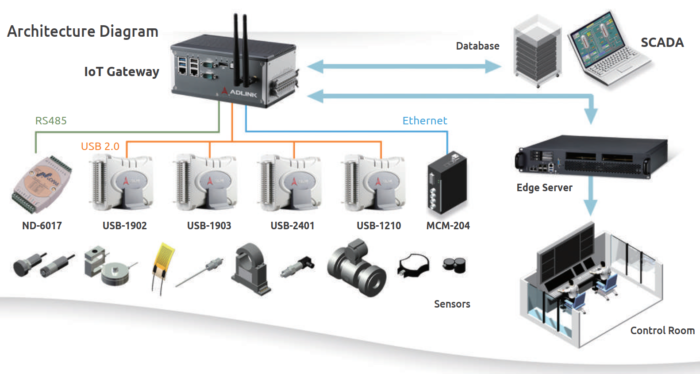ADLINK USB DAQ Modules Help Semiconductor Fab Embrace Big Data

Introduction
The manufacturing of semiconductor chips demands the highest degree of precision processing. With the inception of big data analysis, edge computing, and artificial intelligence (AI), the semiconductor industry is embracing intelligent automation where the collection of big data is of great importance. Though almost all semiconductor manufacturing equipment is now provisioned with networking capabilities and can automatically upload processing data, more data is needed to establish AI training to achieve optimal production. A Korean semiconductor company decided to deploy the ADLINK DAQ system in its recently expanded facility in China to collect comprehensive equipment and environmental data to build a truly smart factory.
Challenges
When it comes to deploying AI-based intelligent systems to factory production lines, the biggest headache for the IT department and data experts at the headquarters is how to acquire data thoroughly from the shop floor. How do you pick suitable data acquisition devices from the plethora of available options? How do you ensure the accuracy of sensory data acquired from
equipment in consecutive processing? Are the sampling rate and accumulated data quantity sufficient for big data analysis and deep learning at the backend? Will the DAQ devices operate reliably enough in the harsh manufacturing environment to ensure data credibility? Each question poses a big challenge.
In the past, this Korean semiconductor company used low-end DAQ modules in their existing facilities, with a sampling rate as low as 10 S/s, which given the high speed of manufacturing devices, is insufficient for AI big data analysis. Therefore, when the company decided to increase investment in China, they decided to deploy the ADLINK high-end DAQ modules in their new facilities to collect equipment and environmental data. These helped them implement AI-based preventive maintenance and quality management system, with the goal of zero downtime, decreased cost, and increased revenue.
The Solution
The ADLINK USB DAQ family comprises a series of products providing analog-to-digital signal conversion at a sampling rate ranging from 10kS/s to 250kS/s with 16 or 24-bit resolution. Embedded with software and multiple signal conditioning circuits, the ADLINK USB DAQ is a plug-and-play device that can support over 80% of sensors on the market. It is convenient to install and boasts the highest performance to cost ratio. The Korean company has deployed many ADLINK USB DAQ modules in its new facility in China to acquire data from sensors and transmit processed data to the cloud. The pre-processed data merges with production data uploaded from processing machines, ready for analysis by data experts at the headquarters.
- Plug and Play requiring no codingPowered via USB, the ADLINK USB DAQ devices, once connected, can be automatically recognized and configured to work in your application, without the need to write a single line of code. The users may assign unique device IDs to each DAQ module to conveniently identify operating DAQ devices.
- Ruggedized connector for severe environmentThe ADLINK USB DAQ modules use a lockable USB cable to secure the connection in the high vibration manufacturing environment. It also includes a detachable mount so the DAQ can be mounted to a rail or wall for convenience.
- Embedded signal conditioning for connecting various types of sensors
Compared to conventional data acquisition cards, which can merely meter voltage signals, the ADLINK USB DAQ modules are embedded with multiple signal conditioning circuits. They can connect directly to many sense elements, without the need to connect an external signal conditioner, again reducing cost. Embedded signal conditioning circuits include AC transmitter, accelerator, microphone, thermal coupler, RTD, load cell, strain gauge, and others - High sampling rate and high resolution for precision measurement
The ADLINK DAQ family comprises a series of products that support 16 bit or 24-bit resolution data acquisition with a maximum sampling rate of up to 250kS/s. The following DAQ modules are available:
– USB-1903, with embedded high precision power resistor that can measure 0 to 20mA current signals
– USB-110, the only USB-powered DAQ on the market that supports 2MS/s sampling rate
– USB-2401, with 24-bit, 4-CH simultaneous-sampling analog input, and a maximum sampling rate of 1.6 kS/s per channel.
Customers may choose any modules in the series to apply to a wide variety of high-precision measurement applications.

- Rich software support reduces time to market
ADLINK provides the UD-DASK SDK for all USB DAQ modules. The SDK works under various operating systems. There is also a free software tool, U-test, that supports data storage, alarm notifications, data export to Excel, and real-time FFT spectrum analysis. You don’t have to write a single line of code to enable measuring functions; you simply set parameters via a graphical interface.
Customer Benefits
- Complete product portfolio for one-stop shopping:In addition to DAQ modules, ADLINK provides all the products you need to deploy intelligent systems, from data acquisition to edge computing and AI development.
- Suited for large scale deployment to reduce cost:The ADLINK USB DAQ products feature ease-of-use, flexible expandability, and extreme reliability. These features significantly reduce the manpower, time, and resources needed for system development and deployment, and minimizes system maintenance cost during the device service life.
- Comprehensive data acquisition to reap the benefits of intelligent manufacturing:According to current estimates, the ADLINK DAQ system helps reduce equipment maintenance costs by 30%, reduces defective items and scraps by 40%, and improves production efficiency by 20%.

